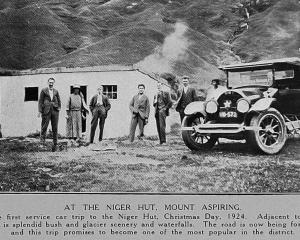
He says the British Army has lately been fully recruited from a magnificent stream of sturdy ex- soldiers, and the Communist societies, whose membership is now 6000, draw attention to the fact that demobilised men are making a great effort to capture their organisations. The principal association (the National Union of Ex-soldiers, popularly called “Nux”) seems at present largely in the Communists’ hands. It teaches the convention of Marxism and has drawn up a long programme, demanding the national ownership of land and capital, and the popular control of industry. Many agitators, even conscientious objectors, have secured affiliation with the union as associates, and are leading such a movement as the seizure of houses, baths, and halls. The correspondent makes no comment, but points out that the union has 480 branches and an estimated membership of 100,000.
Flying to the races
Considerable interest was taken in an aeroplane which passed over Dunedin shortly before noon yesterday on its way to Wingatui from Timaru. It flew fairly low, circled the city once, then alighted at the race course, where the two passengers were landed. Shortly before six the plane took flight for the return journey and passed over the city at a considerable altitude. A Press Association message from Timaru states that the plane had a good trip both ways, the time occupied on each journey being 95 minutes. The machine had to rise to an altitude of 7000 ft in order to get above a fog part of the way. A trip from Timaru will probably be made to the Wyndham races on Saturday.
Race trains popular
The railway traffic to the races at Wingatui was again heavy yesterday, and about 5000 passengers were taken out. Of these 4641 were conveyed by the special race trains and 330 went by the ordinary trains.
Pacific sardine industry
Big industries, as well as big events, grow out of little things. The sardine is probably the smallest fish utilised for food, and yet the canning of this toothsome morsel is developing into a very large industry on the Pacific coast of North America. We have often heard of a tail wagging the dog, and the sardine industry is a case in point, for its beginning in Southern California grew out of the exigencies of another fish canning industry — that of the tuna. Tuna fish are large, very undependable in habit, and although canned tuna is a strong rival of the salmon, the conditions surrounding the tuna packing plants were very unstable. There was either a feast or a famine of the big fish, and to stabilise conditions somewhat the packers turned their attention to utilising some of the small fish caught by the fishing nets operating in the vicinity. The first sardine canning was done merely as a side issue, but its development has been so rapid that now the sardine industry outranks that of salmon fishing in many parts of the West Coast.
— ODT, 29.12.1920.












